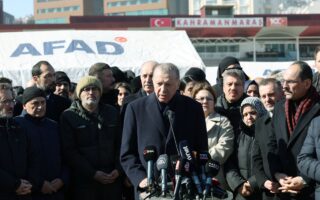Seismic rifts and the fork in the road

The climate crisis, the pandemic and now the great earthquakes in Turkey and Syria remind us constantly that no country alone is able to deal with great natural disasters and their immediate and indirect consequences – from the massive death toll and the desτruction of buildings and infrastructure, to high prices, mass migration and the political turmoil that these cause.
The war in Ukraine falls into this category, as a Russian victory there would transmit the virus of belligerence across the planet. That is why countries which feel that there is far more at stake than Ukrainian independence have rushed to the country’s assistance.
Humanity is at a fork in the road – it must choose between necessary cooperation for the collective good or the delusion of self-sufficiency and autonomy.
The earthquakes hit Turkey with the power of parable. They bring to mind the line in Shelley’s “Ozymandias,” where, engraved in the pedestal of a fragmented statue, a traveler reads the words, “Look on my works, ye Mighty, and despair!”
The “king of kings” wanted his glory to provoke awe in future generations. All that they achieve, though, is to make a traveler understand the vanity of ambition.
Erdogan has tied himself to pharaonic construction projects and projected the image of omnipotence inside and outside Turkey. Now, under pressure from his beleaguered people, he must accept assistance even from countries with which he cultivated tension. (It remains doubtful, however, that he will accept the need for cooperation domestically, with his political rivals.)
Autocracy and nationalism reach their limits. Erdogan’s and Turkey’s future depends on whether he will accept reality and change policy or whether he will persist with conflict.
Humanity faces the same choice. Clearly, the “Westphalian System,” established in 1648 to put an end to Europe’s religious wars, is no longer sufficient. Borders may remain sacrosanct, but countries are called on to accept “limited sovereignty” for the sake of essential cooperation towards a common goal: the survival and prosperity of their people.





